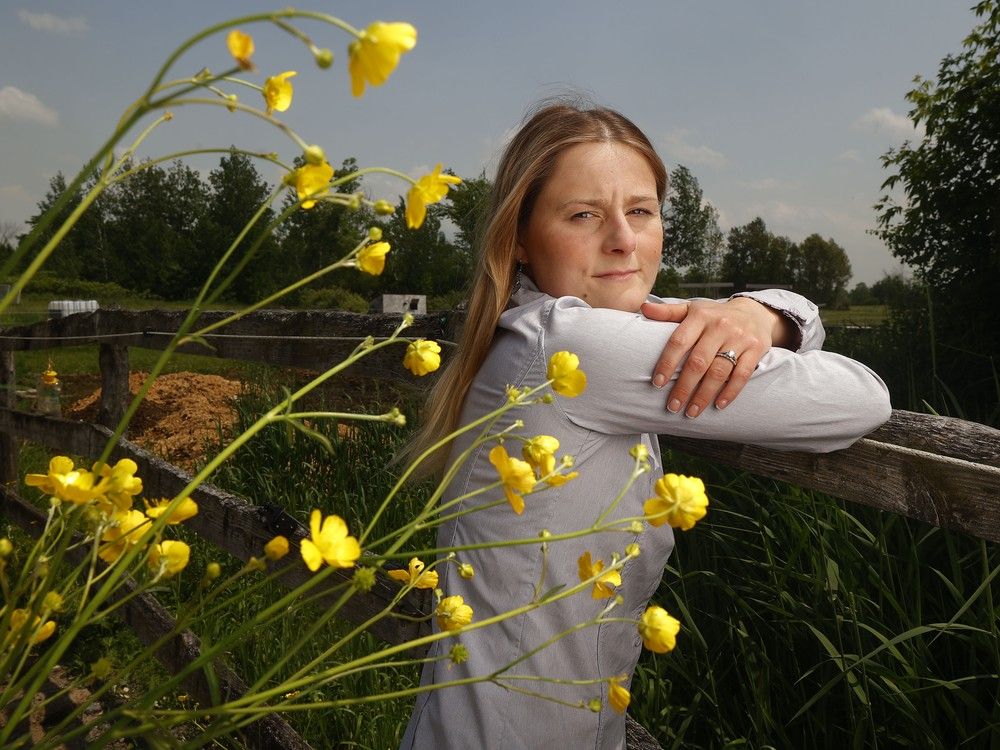An engineer who presented safety data about battery energy storage systems to the city’s Agricultural and Rural Affairs Committee last week had his registration with a professional body yanked in February after he “admitted that he demonstrated professional misconduct.”
Stephen Ramsay, an engineer with a PhD from Cambridge University, spoke to the committee on June 5. He was one of 60-plus speakers with a five-minute time slot to address a
controversial proposal
to build a six-hectare battery energy storage system (BESS) facility on Marchurst Road near Dunrobin.
Brookfield Renewable Power Inc., through Evolugen, a Canadian company, was seeking a Municipal Support Resolution (MSR), an instrument introduced by the provincial government to gauge a municipality’s interest in building new energy projects.
BESSes are needed as Ontario grapples with increased demand for energy, say proponents of the $650 million project. But one of the most contentious issues around BESSes, which use lithium-ion batteries to store electricity during off-peak periods in order to release it during peak demand periods, is the possibility of fire.
Ramsay told the committee he was speaking on the scope of the work that was done by Calvin Consulting in support of the Evolugen application.
“We were responsible for modelling the consequences of potential fires from the BESS facility and the consequences in terms of the emission of hazardous gasses, particularly focusing on hydrogen fluoride,” said Ramsay.
BESS Systems have transitioned to ones that use the LFP chemistry, which is used in the current application, he said. (LFP batteries are also known as lithium iron phosphate batteries.)
“This is a process which has occurred over many years during which we have been actively involved in this aspect of BESS projects,” Ramsay told the committee. “The motivation for this, of course, was to try to improve the safety by reducing the incidences of thermal runaway and the consequences resulting from fires.”
In response to questions from Orléans East-Cumberland Ward Coun. Matt Luloff asking him to simplify his comments, Ramsay responded: “Basically what we’re saying is that as we’ve changed from the old chemistry, which seemed to be essentially inherently dangerous, to the one which is LFP, which we are beginning to see is much, much safer.”
He added: “And the whole point of this LFP battery is to formulate a battery which is much, much less susceptible to thermal runaway, and one which does not have this harmful consequence of producing nasty gases.”

But a project opponent says she’s concerned about transparency after learning that Ramsay had his registration revoked by Engineers and Geoscientists British Columbia.
“How do we know that the right people are working on this project?” said Courtney Argue, who owns a 10-hectare farm about 400 metres from the proposed project.
Argue said she was curious about Ramsay’s background and later learned that Engineers and Geoscientists British Columbia had cancelled his registration in February. She said she first encountered surveyors working for Evolugen who were mapping the area on her fence line on Jan. 8, and her questions about the project have often received “superficial” answers.
“There is a lot of doubt in the community,” said Argue. “It’s all about timelines. It’s all about getting to an end goal. We’re not just an obstacle. We’re real people who rely on this land.”
Ramsay is “often called upon as an expert witness in complex environmental and engineering matters,” according to his profile in LinkedIn.
“Known for his clarity, depth, and integrity, he has testified in hearings and trials across Canada and internationally,” said the profile, which added that Ramsay specializes in environmental engineering, risk assessment, and structural dynamics “with a focus on high-stakes industries including energy, transportation, chemical processing, and infrastructure development.”
According to a discipline notice released in March by Engineers and Geoscientists BC, which regulates engineers in that province, Ramsay “admitted that he demonstrated professional misconduct in relation to the geohazard assessment report he prepared in support of a development permit application for a proposed single-family home.”
Ramsay was hired in 2021 to prepare the report in support of a development permit application for a proposed single-family home in Hatzic, B.C. But his report was “deficient and did not comply with the requirements” set out in the Engineers and Geoscientists BC professional practice guidelines on legislated flood assessments in a changing climate or the legislated landslide assessments for proposed developments in B.C., according to Engineers and Geoscientists BC.
In the consent order, Dr. Ramsay admitted that he demonstrated professional misconduct relating to the report, and agreed that, among other things, he failed to conduct contour mapping to accurately determine site elevation and plagiarized portions of the report from two other previous studies of the region, said the report. He agreed not to reapply for registration at any time in the future and paid $7,000 toward the legal and investigative costs.
Ramsay did not respond to a request for comment from Postmedia.
According to a spokesperson for Evolugen, Ramsay was engaged by Calvin Consulting for his expertise in air quality and emissions modelling, not by Brookfield Renewable directly.
“His involvement has been limited to that scope, and he was not responsible for completing any site-specific assessments on Brookfield’s behalf. The assessment work for which Dr. Ramsay has received professional discipline is entirely unrelated to the work he has done for Brookfield.”
Ramsay remains qualified in this field, with no misconduct claims or restrictions related to his air quality work or credentials, said the spokesperson.
According to the Evolugen presentation to the Agricultural and Rural Affairs Committee, the MSR is a mechanism recently introduced by the Ontario government to gauge a municipality’s interest in building new energy projects and to signal its readiness to formally evaluate a proposal.
“All technical studies, including environmental assessments, will be conducted independently and to the satisfaction of the Ministry of the Environment, Conservation and Parks and the City of Ottawa,” said the Evolugen spokesperson.
“This is precisely why Brookfield Renewable is seeking the MSR — to enable these studies to be completed.”
A June 4 strategic initiatives department memo to councillors and Mayor Mark Sutcliffe said an MSR is a procurement requirement of the Independent Electricity System Operator (IESO). It does not preclude projects from having to obtain any municipal development approvals or permits to be built, and city council retains full decision-making authority regardless of whether an MSR is approved.
Comprehensive technical studies, such as a detailed site plan, noise and safety assessments, environmental impact assessment and emergency services evaluations for the Evolugen proposal are not yet available, as these studies are required as part of the planning approvals process, which has not yet started, said the memo. As well, mandatory public consultation as required under the Planning Act has also not yet occurred.
The IESO awarded contracts to two BESS projects in Ottawa in May 2024, one on William McEwen Drive in the Rideau-Jockvale ward and another proposal near Fitzroy Harbour. In early 2025, the Fitzroy Harbour proposed project was moved to Marchurst Road, said the memo.
The Agricultural and Rural Affairs Committee turned down the Marchurst Road MSR last week. City council will be contemplating the matter on Wednesday and could overturn the committee’s decision.
In a letter to Mayor Mark Sutcliffe on April 15, Ontario Minister of Energy and Mines Stephen Lecce said if the province can’t address the electrical grid’s capacity needs with battery storage systems, it will reduce the overall cleanliness of Ontario’s grid while also increasing costs to ratepayers.
“Municipalities that make the approval and permitting process for BESS projects overly onerous or prohibitive endanger the region’s growth and the province’s ability to meet forecasted electricity demand, which is projected to increase by 75 per cent by 2050,” said Lecce.
Our website is your destination for up-to-the-minute news, so make sure to bookmark our homepage and sign up for our newsletters so we can keep you informed.
Related
- Massive Battery Energy Storage System project sparks controversy at Ottawa committee meeting
- Federal government urged to spend more on rural housing, connectivity, public safety



